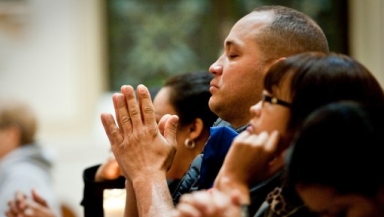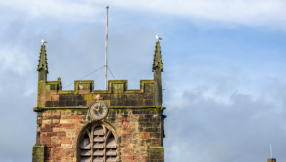
Experts on Catholicism, Anglicanism and Pentecostalism gathered in Whitehall last night to debate the future of the Global Church.
Speakers including the former Labour Secretary of State for Education and Skills, Charles Clarke and author of a bestselling biography on Pope Francis, Paul Vallely debated the question, "Can historic global Churches maintain central authority or must they devolve?"
Professor Kirsteen Kim from Leeds Trinity University argued that the Roman Catholic Church, which contains "half of all Christians", has maintained a hierarchical structure "although not without significant membership losses". Under Pope Francis "this picture may be about to change significantly", she said.
Allan Anderson, Professor of Mission and Pentecostal Studies at the University of Birmingham explained that "despite the secularisation of Europe and the Western World as a whole" there had been a "remarkable resurgence" of Christianity in the Global South, especially in Africa, Latin America and Asia.
He said both the demographics and character of Christianity had "fundamentally changed" so "what might be familiar to many of us in this room would be very unfamiliar to many Christians in the world today".
Prof Anderson also commented that a quarter of the world's Christians belong to some form of Pentecostalism and that this proportion is higher outside of the Western world.
"Christians in the South live in a spiritual universe that is not dichotomised. In one breath they can talk about political, social or economic liberation and in the same breath talk about liberation from supernatural evil forces."
In explaining why there are thousands of Christian denominations worldwide the professor said it was "in the nature of Protestantism" to schism because of its focus on the authority of local churches.
Church of England Curate Christopher Landau admitted the Anglican Communion shares more on "where they come from than where they are going to".
He also admitted that a "car crash" has followed the "notorious 1998 Lambeth Conference" that continues to affect the life of the communion. He said there was much which was "pragmatic and attractive" about the Anglican Communion adopting a model similar to the Commonwealth but warned pragmatic was "not necessarily a theological word".
"We have to take a step back or a step deeper into some of the theological questions and say if we're really aspiring to be one body of Christ across all of these different dominations what does it mean when I disagree profoundly with someone else?"
Vallely spoke next and said the debate around homosexuality was a "more deeply rooted problem" than the controversy over women bishops.
"[The Archbishop of Canterbury] Justin Welby has to find a way of keeping together in the communion two sides whose views are fundamentally incompatible," he said.
He argued for a balance between an authoritarian magisterium and a lively and authentic expression of Christianity, saying there were "dangers at both extremes".
The biographer of Pope Francis added that Catholic conservatives are reminding the Pope that revolutions come when authoritarian regimes liberalise, but in Mr Vallely's view, Pope Francis was "not deterred" by this.
The biographer of Pope Francis quoted Justin Welby's words at General Synod that the Church should not be afraid of "incoherence and inconsistency" and that "untidy arrangements are better than splits".
Professor Linda Woodhead, director of the Religion and Society Research Programme, described the Anglican Communion as a "very, very dysfunctional family" and questioned why unity was being imposed.
Prof Kim said she was "suspicious of movements toward unity" and argued that historically there had never been one church, but rather a diverse and polycentric movement.
Describing himself as an "outsider", Prof Allan Anderson, of the University of Birmingham, said he admired both the Roman Catholic Church and the Church of England's ability to "hold together diversity".
"The question is of course 'do we have a free for all?' which is what a lot of new Pentecostal groups, Charismatic churches are doing. Everyone sets up a church here there and all over the place. Some of them are very successful but they are run on market principles.
"The nature of Christianity is changing … It's creating more decentralised forms of Christianity which I think the Catholic and Anglican churches can contain within themselves …The largest Catholic church in Brazil is run by a charismatic Anglican priest who gets 10,000 people in his church on a Sunday … he's a former aerobics instructor."
In responding to comments about colonialism Christopher Landau explained that a Nigerian priest he met "embraces and is delighted in his Book of Common Prayer: Traditional English hymns".
"Absolutely Nigerian Christianity and he does not feel any sense of inadequacy in that," he said.
He added that Alpha had become a "curious international phenomenon" which is an example of "fruitful ecumenicalism".
The panel also debated the prosperity gospel and women in leadership before Mr Landau observed that Pope Francis has "changed the ethos without thus far, as far as I can tell, changing much of the policy. Quite what happens going forward will be fascinating."
The debate was the second of six events debating global religious trends. The next debate will ask "Are attempts to promote worldwide religious freedom naïve or necessary" and speakers will include Alastair Burt MP and Professor Elizabeth Shakman Hurd.
The audio and video from last night's debate will be posted on FaithDebates.org.uk in the coming days.













